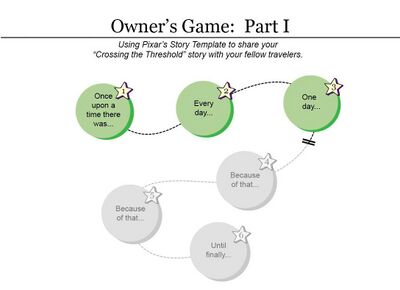Challenge 3: Your Hero's Journey: Difference between revisions
No edit summary |
|||
| (2 intermediate revisions by the same user not shown) | |||
| Line 1: | Line 1: | ||
{{blc| Challenge 3: Your Hero's Journey }} | {{blc| Challenge 3: Your Hero's Journey }} | ||
{{choice}} | |||
=404= | |||
https://sites.google.com/actonacademy.org/toolshed-year1/begin-with-the-end/handbooks | |||
= The 12 stages: = | = The 12 stages: = | ||
Latest revision as of 11:23, 26 June 2024
Challenge 3: Your Hero's Journey [∞]
404
https://sites.google.com/actonacademy.org/toolshed-year1/begin-with-the-end/handbooks
The 12 stages:
1. Call to adventure
- the hero is given a invitation/challenge to 'adventure'
2. asssistance
- the hero gets help
3. departure
- Hero goes into the world and out of his/hers/their comfort zone
4. trials
- The hero goes through challenges like riddles, traps, defeating a villain, etc.
5. approach
- the hero faces their 'biggest fear'
6. crisis
- hero faces defeat
7. treasure
- hero claims award
8. result
- a flee from the 'monsters' from the special world?
9. return
- hero goes back to his comfort zone
10. newlife
- Hero lives his life
11. resolution
- everything gets straightened out
12. Status Quo
Journey
1. Once upon a time: There was a retired engineer who had discovered an ancient artifact which demanded that it be shared.
2. Every day he would write letters, post in on-line forums, and talk with people everywhere he went. But no one believed him. One day he was told he should write a book.
3. Writing books was completely out of his comfort zone. He was use to working in teams and discussing issues. With a book he would be writing for an unknown audience. He could not see their eyes as he talked with them to gauge if they were understanding.
4. There was much to learn about writing books, many skills that were new to him, and choices to make without sufficient information to weigh possible results.
5. The biggest challenge would be the discipline of writing on demand, on a schedule. This would not be writing reports on others' work, but words that had to be generated from the treasure and passed through his heart.
6. No one would read the first 'book' he wrote. He discovered that the idea of the treasure was so outside the experience of people, that they did not have the words in their heads to even think about it.
7. Then he shared with a child. The child understood. The artifact could only be understood by those who were like children.
8. Now he seeks to find those who can understand, and he writes books for them.
